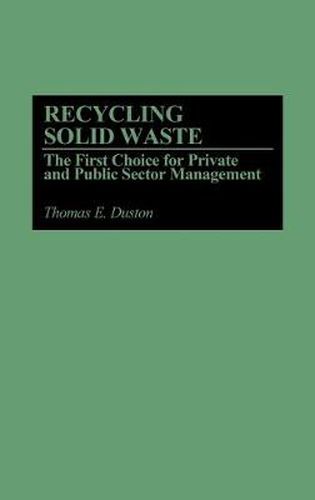Readings Newsletter
Become a Readings Member to make your shopping experience even easier.
Sign in or sign up for free!
You’re not far away from qualifying for FREE standard shipping within Australia
You’ve qualified for FREE standard shipping within Australia
The cart is loading…






Recycling can be the first choice in many solid waste disposal situations according to Thomas Duston. In this timely and pathbreaking book, the author guides the reader carefully through the recycling process from trash to market, with a detailed description of how to figure both costs and benefits at each stage. The book emphasizes the crucial importance of careful planning for solid waste management. Extra attention is given to the often misunderstood concept of cost avoidance, as well as to the central role of materials processing in the handling, storage and marketing of recyclables. A unique feature is the inclusion of a separate chapter on the 10 questions you most likely will be asked. The questions and answers are extremely helpful to those working on recycling. They are derived from the author’s extensive experience with many different audiences interested in, and often skeptical about, recycling. Extensive appendices are included, with useful lists of equipment sellers, trade association, educational materials, specialized recycling opportunities, and other important reference materials.
The planning phase of setting up a recycling program consists of three separate areas requiring careful preparation: (1) Specific detail must be gathered on the materials content of one’s own waste stream; (2) potential materials handling and processing equipment–balers, chippers, specialized trucks, granulators, etc.–must be researched and understood; and (3) the financial skills needed to estimate both costs and benefits must be developed. The first section of the book covers these crucial planning functions. Once this planning is done, then recycling implementation and evaluation—the middle section of the book—are very straightforward. Considerable practical advice on setting up a recycling plan with the best chance of success is the focus throughout these first two sections. The main objective of the book is to provide an invaluable first reference book for the practical management of almost any solid waste disposal situation. However, the last part of the book does provide a theoretical focus for those interested in either the microeconomics of recycling or the place of recycling within the larger framework of waste generation and disposal in a high- consumption society. This book can also be used as a supplement in college courses in environmental studies and resource management, as well as applied economics.
$9.00 standard shipping within Australia
FREE standard shipping within Australia for orders over $100.00
Express & International shipping calculated at checkout
Recycling can be the first choice in many solid waste disposal situations according to Thomas Duston. In this timely and pathbreaking book, the author guides the reader carefully through the recycling process from trash to market, with a detailed description of how to figure both costs and benefits at each stage. The book emphasizes the crucial importance of careful planning for solid waste management. Extra attention is given to the often misunderstood concept of cost avoidance, as well as to the central role of materials processing in the handling, storage and marketing of recyclables. A unique feature is the inclusion of a separate chapter on the 10 questions you most likely will be asked. The questions and answers are extremely helpful to those working on recycling. They are derived from the author’s extensive experience with many different audiences interested in, and often skeptical about, recycling. Extensive appendices are included, with useful lists of equipment sellers, trade association, educational materials, specialized recycling opportunities, and other important reference materials.
The planning phase of setting up a recycling program consists of three separate areas requiring careful preparation: (1) Specific detail must be gathered on the materials content of one’s own waste stream; (2) potential materials handling and processing equipment–balers, chippers, specialized trucks, granulators, etc.–must be researched and understood; and (3) the financial skills needed to estimate both costs and benefits must be developed. The first section of the book covers these crucial planning functions. Once this planning is done, then recycling implementation and evaluation—the middle section of the book—are very straightforward. Considerable practical advice on setting up a recycling plan with the best chance of success is the focus throughout these first two sections. The main objective of the book is to provide an invaluable first reference book for the practical management of almost any solid waste disposal situation. However, the last part of the book does provide a theoretical focus for those interested in either the microeconomics of recycling or the place of recycling within the larger framework of waste generation and disposal in a high- consumption society. This book can also be used as a supplement in college courses in environmental studies and resource management, as well as applied economics.